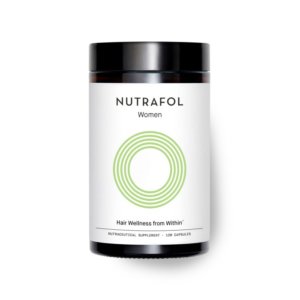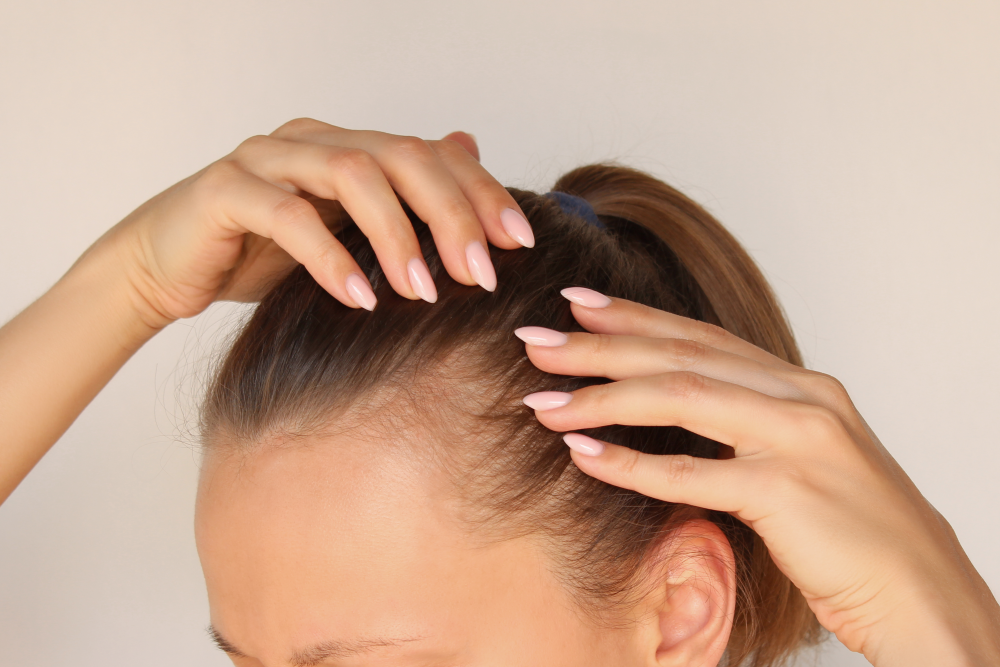Bald spots, thinning hair, shedding more than usual, and even dull, brittle hair may occur for numerous reasons. Many people believe genetics and hormones are the only causes when it comes to changes to hair growth and health. Hair loss related to vitamin deficiency is more common than most know. According to Dr. Esther (E.B.) Henebeng of U.S. Dermatology Partners Fairfax, “Diet, specifically the vitamin and mineral content in our diets, can contribute both positively and negatively to hair health. The right blend of nutrients improves the appearance and growth, but without the right vitamins and minerals, patients can struggle with brittleness and hair loss or thinning.” In this blog, Dr. Henebeng talks about how vitamin deficiencies and hair loss are linked and how dermatologists can help support improved hair health.
Understanding Hair Loss: More Than Just Genetics
Many people think that their hair health and thickness depend entirely on their family tree, but genetics is only one factor that impacts hair growth. There are many underlying causes of hair loss, including:
- Genetics – yes, heritage does play a role in determining how likely you are to lose hair, but it’s not the only factor.
- Hormonal shifts – changing hormone levels as we age, during pregnancy and menopause, and at other life stages impact the hair growth cycle causing hair thinning or loss.
- Stress – this one is also connected to hormones. The production of the hormone cortisol spikes during stressful times. Cortisol can stall the hair regrowth cycle as well as lead to weaker hair roots.
- Medical conditions – thyroid disease, skin infections of the scalp, and some autoimmune disorders among others contribute to hair loss.
- Poor nutrition – deficiencies of vitamins and minerals in the diet contribute to the thickness, appearance, and lack of hair growth
Can Vitamin Deficiencies Cause Hair Loss? Yes—Here’s How
Hair can show signs of poor nutrition or illness before other parts of the body. Nutrients are sent to more vital areas like the heart and brain before they have a chance to reach the hair, so warning signs of nutrient deficiencies are often noticeable in the hair first. The hair follicles are some of the most metabolically active, which means they require an abundance of nutrients to ensure proper function. When diet lacks these nutrients, follicles can weaken, hair growth may slow, and the texture and appearance of hair changes.
Top Vitamin and Mineral Deficiencies Linked to Hair Loss
You may be wondering what vitamins and minerals are most important to hair growth. Below, Dr. Henebeng discusses the top vitamins for hair growth and how you can add them to your diet.
Vitamin D
Vitamin D plays a crucial role in the creation of new hair follicles and regulation of the hair growth cycle. Low levels of vitamin D are commonly seen in people with alopecia areata.
Signs of Deficiency
- Thinning hair.
- Increased shedding.
- Scalp sensitivity or inflammation.
Top Sources of Vitamin D
- Fatty fish, like salmon, mackerel, and sardines.
- Fortified milk or plant-based dairy alternatives.
- Egg yolks.
- Sunlight at least 10–30 minutes of sun exposure several times a week, but don’t forget the sunscreen!
Iron
Iron is essential for carrying oxygen to cells, including hair follicles. A deficiency in iron, particularly ferritin (stored iron), leads to chronic hair shedding and slowed regrowth. This deficiency can be common in menstruating women as well as vegans and vegetarians.
Signs of Deficiency
- Thinning spots.
- Excessive shedding.
- Hair that feels dry and brittle.
Top Sources of Iron
- Lean red meats.
- Chicken and turkey.
- Spinach and kale.
- Lentils, beans, and chickpeas.
- Fortified breakfast cereals.
Zinc
Zinc is critical for hair tissue repair and proper functioning of the oil glands around hair follicles. Zinc deficiency leads to hair shedding and a dry, flaky scalp. This deficiency is most common in pregnant and breastfeeding women, children, older adults, and those taking certain medications.
Signs of Deficiency
- Brittle hair or increased breakage.
- Greater hair loss and shedding.
- Scalp irritation or dandruff.
Top Sources of Zinc
- Oysters (the richest source!).
- Beef.
- Pumpkin seeds.
- Cashews.
- Chickpeas.
Biotin (Vitamin B7)
Biotin supports keratin infrastructure, which is the protein that makes hair, skin, and nails strong and beautiful. While true biotin deficiency is rare, it can occur for people who take antibiotics for an extended time, those with Crohn’s disease, and individuals who eat raw egg whites.
Signs of Deficiency
- Thinning hair.
- Bald patches.
- Brittle or coarse strands.
Top Sources of Biotin
- Cooked eggs.
- Almonds and walnuts.
- Sweet potatoes.
- Sunflower seeds.
- Avocados.
Vitamin B12
Vitamin B12 is vital for red blood cell production and oxygen delivery to tissues, including the scalp. Low B12 is most common in older adults, vegans and vegetarians, and those with gastrointestinal disorders.
Signs of Deficiency
- Hair loss.
- Slower hair growth.
- Dry scalp.
Top Sources of B12
- Meat, especially beef and liver.
- Dairy products.
- Eggs.
- Fortified cereals.
- Fish, like salmon and tuna.
Should You Take Vitamins for Hair Loss? What Dermatologists Say
Relying on supplements alone for hair health support, is usually not enough to maintain adequate levels. However, vitamin supplements can be essential for those combatting a deficiency. According to Dr. Henebeng , “Many people consume supplements too readily. Self-diagnosis and relying entirely on supplements can actually do more harm than good. Consult a dermatologist to test for deficiency and prescribe specific supplements. Additionally, adding more nutrients to the diet is important in ensuring proper nutrient absorption.”
Dermatologist-Recommended Solutions for Hair Loss
For those experiencing hair loss or thinning, there are numerous dermatologist hair loss treatment options available, including supplements and dermatologic procedures.
Nutrafol Supplements

PRP Therapy
Platelet-rich plasma therapy, usually referred to simply as PRP therapy, is a cutting-edge dermatologic approach used to achieve a range of skincare and hair health goals. To improve hair health using PRP therapy, the dermatologist draws a small amount of blood and extracts platelets. This platelet-rich blood plasma is injected into the scalp. The platelets release growth factors that stimulate hair follicles to prolong the growth phase of the hair cycle. This increases hair growth as well as improving thickness and strength of hair strands.
Conclusion: Don’t Face Hair Loss Alone
Finally, Dr. Henebeng says, “Hair loss can be frustrating, embarrassing, and confusing, but you don’t have to face the challenge alone. As a dermatologist, I love working with my patients to establish a plan to improve hair growth and health because I see their confidence return as the results appear. If you’re worried about hair loss related to genetics, hormonal imbalance, vitamin deficiency, or any other reason, talk to your dermatologist about how to prevent hair loss and tackle these issues, so you look and feel your best.”
Ready to Reclaim Healthy Hair?
Early intervention is always key to preventing advanced hair loss, so don’t hesitate to reach out to U.S. Dermatology Partners when you first notice changes to your hair health. Scheduling a consultation with one of our board-certified dermatologists is quick and easy. Take a few moments to fill out our online scheduling request form. A local dermatology team member will be in touch to finalize the details of your visit.
Find a location near me
or


